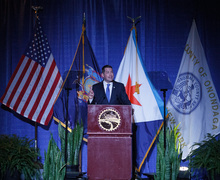Nearly 3 years after adding full-time psychiatric services, Syracuse University is still assessing best way to meet student needs
Renee Zhou | Staff Photographer
Syracuse University students have advocated for more psychiatric services, but nearly three years after adding full-time psychiatric services for the first time, administrators said they’re not sure adding more staff is needed.
As Madeleine Slade stood in the bright sunlight on the Quad last September watching students mill about between classes, one of her friends spotted her and walked over.
“Hey, where did you come from?” Slade’s friend asked.
“You don’t want to know,” she replied.
Slade, a junior illustration and women’s and gender studies dual major, had spent about four hours waiting to see a psychiatrist at St. Joseph’s Hospital Health Center. She visited the Syracuse University Counseling Center earlier that day when the anxiety medication her hometown psychiatrist had prescribed her stopped working. Her panic attacks had returned and Slade said she began to experience suicidal ideation.
The Counseling Center gave her an emergency appointment but told her she would need to schedule a regular counseling appointment and then get a referral to see the SU psychiatrist. The process, she was told, would take about two weeks. Slade told them she couldn’t wait that long and was referred to St. Joseph’s.
Psychiatric services at SU have become an increasing visible topic of debate on campus in the last few months. THE General Body, a coalition of SU student organizations, included the expansion and improvement of psychiatric services in its list of demands and grievances that served as the centerpiece for the organization’s 18-day sit-in last November.
But while students have advocated for more psychiatric services, nearly three years after adding full-time psychiatric services for the first time, administrators said they’re not sure adding more staff is needed.
Ben Domingo, director of Health Services, where psychiatric services is housed, said Slade’s situation may have been the result of a breakdown in communication between the Counseling Center and Health Services. But he added that if a student is a threat to themselves or others, they should be referred to St. Joseph’s.
Even at its current level, the presence of psychiatric services at SU remains a bit of an outlier in the college mental health landscape. Nationally, only 58 percent of four-year colleges offer psychiatrist services on campus, according to the 2014 National Survey of College Counseling Centers report, despite 86 percent of directors reporting an increase in students arriving on campus already on psychiatric medicines.
The university added full-time psychiatric services in Fall 2012 when the school hired a psychiatrist and then, due to high demand, added a psychiatric nurse a month later. Previously, the university had a part-time psychiatrist who worked about 16 hours a week, said Rebecca Dayton, associate vice president for health and wellness.
Dr. Wendy Armenta, the university’s psychiatrist, and Heidi Kinnally, SU’s psychiatric nurse practitioner, both declined to be interviewed for this article.
In regards to staffing, Domingo said he’s still trying to figure out whether the current level is enough to meet demand. Last academic year, the only year where psychiatric services were fully staffed the entire time, there were 985 visits.
It takes about a week to get an appointment and it may take two weeks during busier times. But arrangements can be made if a student needs to see the psychiatrist sooner. Many psychiatric needs can also be filled in the general clinic as all Health Services doctors can — and do — prescribe psychiatric medication, Domingo said.
If psychiatric services are expanded, then the cost — and where that money will come from — needs to be considered, Domingo added.
“Are we going to increase the health fee on students? Are we going to start charging co-pays? You know, everybody is like, no, no, no, we pay enough for the health fee,” he said. “That’s fine but you can’t keep saying more, more, more, more, more to everything without realizing there’s some give and take.”
Slade, the SU junior, started taking psychiatric medicine for the first time last summer when her panic attacks worsened, and a psychiatrist in her hometown proscribed Prozac. When the medicine finally kicked in, about a week before school started, Slade said she felt wonderful and that she “could do things again without feeling anxious.”
Though the relief for Slade was initially short-lived, the use of psychiatric medicine is becoming more common due to advances in these drugs. While these drugs have helped many students attend college who otherwise might not have, colleges often aren’t yet fully prepared to deal with this emerging trend, said Dr. Nance Roy, clinical director at The Jed Foundation, a national organization that promotes emotional health and works to prevent suicide on college campuses.
At SU, increasing demand for psychiatric services means this service operates on what Domingo refers to as a “semi short-term model.” No official session limit exists and how long students see a psychiatrist varies for each student.
Because both the Counseling Center and Health Services can refer to psychiatric services, availability is limited and it’s hard to see everyone on a long-term basis, Domingo said. But because of inadequate psychiatric options in the wider community — many psychiatrists have six to eight week waitlists and don’t accept insurance — students often need to be seen for longer periods of time, he added.
Under the current policy, students have to receive a referral and be in therapy to see the psychiatrist. Health Services staff can also prescribe medication in certain cases such as when students have uncomplicated depression or anxiety. These students are referred to the Counseling Center but aren’t required to see a therapist, Domingo said.
The policy of linking psychiatric medication to therapy is unpopular with some students who want psychiatric medication, or a refill of medication prescribed by their hometown psychiatrist, without the therapy. Domingo defended the policy and said therapy is an integral part of treating mental health concerns.
For most mental disorders, the medication is secondary, Domingo said. Receiving medication for a mental illness and not going to therapy would be like being on blood pressure medicine and living off cheeseburgers and soda, he added.
“I don’t think people get that. And that’s why people are like, ‘Wow, you’re being obtrusive’ or, ‘You’re not helping me because I just want my Prozac, I don’t want to go to therapy,’” he said. “Then what you’re not doing is you’re not following our philosophy of what really good treatment is for many psychiatric disorders.”
When SU hired a full-time psychiatrist in 2012, the decision was made to house psychiatric services in the Health Services building instead of the Counseling Center, where the part-time psychiatrist had worked. This decision was made to ensure medication being prescribed would not conflict, Domingo said.
But the decision also means students have to go to the Counseling Center for therapy and then walk to the Health Services building for medication. Both Domingo and Counseling Center Director Cory Wallack hope that will eventually change and would like to see a joint building on campus where students can come for all their health and wellness needs.
Slade, the SU student, said she thinks a joint building would definitely help Health Services and the Counseling Center better connect. She would like to see more psychiatrists hired too, something she’s been active in advocating for with THE General Body.
“We need to think about mental health not just as an individual issue but as something that affects entire groups of people,” she said.
– 30 –
Published on April 22, 2015 at 9:51 pm
Contact Jessica: jliannet@syr.edu | @JessicaIannetta





